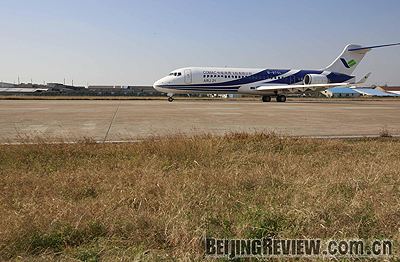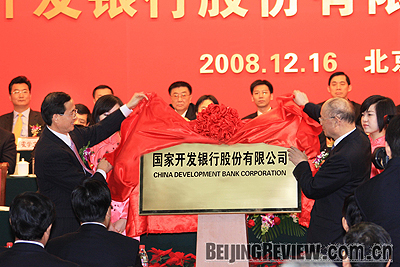|
Chinese companies also encountered enormous losses. The country's second largest insurer, Ping An Insurance (Group) Co., lost about 1.7 billion euros ($2.37 billion) on its stake in Fortis NV when the Belgian's financial institution's share price plummeted to about 1 euro from 19 euros-the price of the shares when Ping An first purchased them.
7. CACC Made Its Debut
China inaugurated the Commercial Aircraft Corp. of China Ltd. (CACC), its first company dedicated to manufacturing large passenger aircraft, on May 12 in Shanghai.

The company is in charge of researching, developing, manufacturing and marketing planes with load capacities that exceed 100 tons. Until now, only the United States, Russia and a few European countries have manufactured large passenger aircraft.
The country's first large passenger aircraft is expected to be introduced by 2020 if everything progresses smoothly.
8. Telecom Giants Regrouped
The government restructured the telecommunication industry in 2008 before issuing three 3G licenses to the major national service providers.
In the past, there were five telecommunication companies: China Mobile Ltd. and China Unicom Ltd. operated wireless businesses, while China Telecom, China Tietong Telecommunications Corp. a relatively smaller operator, and China Netcom Group Corp. Ltd. were fixed-lined operators.
After the regrouping, China Unicom and China Netcom merged into the new "China Unicom," which was tasked with developing WCDMA, a 3G standard. China Unicom sold its wireless CDMA division to China Telecom, which is supposed to develop CDMA2000 technology. China Mobile and China Tietong merged into the new "China Mobile," which tasked with promoting TD-SCDMA technology. China Netcom officially retreated from its listings on the Hong Kong and New York stock exchanges on October 15, but shares of the three new companies continued to be traded in Hong Kong.
9. China Development Bank Incorporated
China Development Bank (CDB), one of the nation's three policy banks, was officially incorporated as a commercial lender on December 1. China's Ministry of Finance and Central Huijin Investment Co. Ltd. hold 51.3 percent and 48.7 percent stakes, respectively, of the CBD.

In December 2008, the CDB received a $20-billion capital injection from China Central Huijin Investment as part of the long-anticipated restructuring fund. This increased the CDB's capital adequacy ratio to 12.77 percent and improved its risk-prevention capabilities. The CDB's ultimate goal of incorporation was to become listed on the stock market in 2009 at the earliest.
10. Corporate Tax Rates Unified
China adopted a new corporate tax scheme in 2008, equalizing income tax rates for domestic and foreign companies at 25 percent.
Previously, Chinese companies were subject to a statutory income tax rate of 33 percent, while many foreign investors received tax waivers or reduced tax rates as an incentive to invest in the country.
The new tax scheme, which came into effective on January 1, 2008, aimed to put domestic and foreign firms on equal footing in income taxation as a government effort to promote fair competition and improve the country's general abilities to use foreign investment.
The government said the new scheme would be phased in over five years. Foreign companies, especially those engaged in clean production, energy conservation and pollution treatment, can still enjoy relatively preferential tax policies during a transitional period before shifting to the new tax scheme. | 